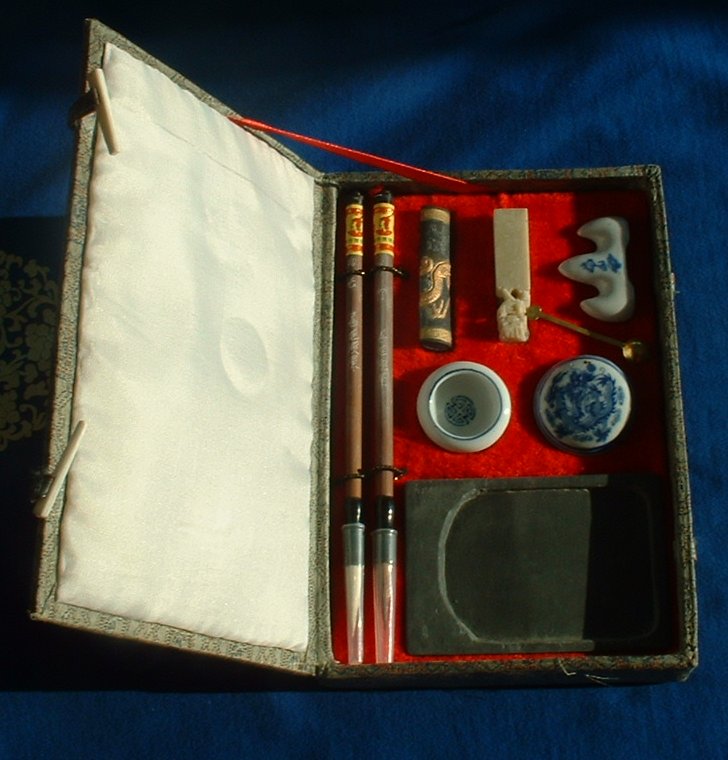Stringless guqin fan painting by Feng Chaoran (1943)
Stolen traight from www.silkqin.com/10ideo.htm on silkqin.com:Wind in the pines and a babbling brook are nature's melody. A qin was brought along, but there is no need to play it
en.wikipedia.org/w/index.php?title=Bo_Ya&oldid=1150295883#The_story_about_Zhiyin:
Bo Ya was good at playing the qin. Zhong Ziqi was good at listening to the qin. When Bo Ya's will was towards high mountains in his playing, Zhong Ziqi would say, "How towering like Mount Tai!" When Bo Ya's will was towards flowing water in his playing, Zhong Ziqi would say, "How vast are the rivers and oceans!" Whatever Bo Ya thought of Ziqi would never fail to understand. Bo Ya said, "Amazing! Your heart and mine are the same!" After Zhong Ziqi died, Bo Ya broke his Guqin because he thought that no one else can understand his music.
Bibliography:
Holy crap amazing list of Guqin pieces by the guy for MP3 download! www.silkqin.com/06hear.htm And the explanations are insane. What a dude. Ciro Santilli's hero.
Download all MP3:
wget -r -np -l 1 -A mp3 http://www.silkqin.com/06hear.htmCiro Santilli Contacted John by email in 2019 telling him to put his stuff on YouTube and offering help, and he replied, but nothing came of it unfortunately. Edit: he uploaded a bunch of videos of him playing live in 2020! www.youtube.com/user/silkqin/videos
John focuses on playing the tunes in a "historically informed performance", in particular using silk strings rather than metal ones which are used by most modern artists: www.silkqin.com/08anal/hip.htm
But there is an awesome guzheng adaptation which is perhaps better known in modern times, partly because it is not as long/slow. TODO origin.
High Mountain and Flowing Water performed on the guzheng by Xiang SiHua (2000)
Source. Performer Chinese name: 項斯華韦编三绝 is a chengyu that means "to study diligently", i.e. to read so much to the point that your book starts to wear down.
There is a Chinese Wiki page for this song: zh.wikipedia.org/wiki/韦编三绝 which says it dates from the early Qing dynasty
Lit: fish timber question answer.
The dialog is also known as allegory for an incredibly deep philosophical discussion between an idealized wise woodcutter and a fisherman, e.g. mentioned at: www2.kenyon.edu/Depts/Religion/Fac/Adler/Writings/Fisherman%20and%20Woodcutter.pdf
This song is just too slow for Ciro Santilli to make much out of it.
Bibliography:
Dialog between Fisherman and Woodcutter Chinese traditional painting by Xie Shichen
. Dialog between Fisherman and Woodcutter performed by Wu Jinglüe
. Source. Accompagnied by di flute to reinforce the idea of two voices. This one has TODO year.www.facebook.com/131402556881886/posts/655763214445815/ gives an origin:The silkqin.com entry: www.silkqin.com/04qart/07sqmp/57ls.htm does not mention this however.
Li Sao was composed by Cheng Kangshi in late Tang dynasty based on the poem Li Sao, authored by Qu Yuan (340-278 BC) in the Warring States period of ancient China.
Li sao performed by Guan Pinghu
. Source. Track from Master Of Traditional Chinese Music: guqinIt is easy to get this piece wrong. Two many videos on YouTube play it too fast. Zhang Ziqian plays perfecly, with slightly inconsistent timing, perfectly simulating the drunkard.
Articles by others on the same topic
There are currently no matching articles.





